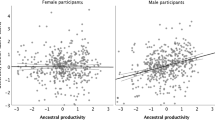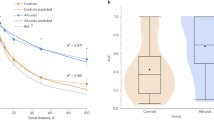Abstract
The current work seeks to contribute as a continuation of evolutionary-based studies investigating the effects of social transgressions on human behavior. Our evolved capacity for social connections is predicated on reciprocal trust within a relationship. In ancestral conditions, violating that trust could have adverse implications on a betrayer, as well as the victim who was betrayed. By looking beyond forgiveness or social estrangements, this study focuses on our willingness to help the offender after a betrayal has taken place. Our main predictions were that future altruism would more likely be offered by the victim if the harm-doer was kin, if the betrayal did not occur publicly, and if the betrayal was relatively minor. To test these hypotheses, we randomly presented 449 participants with betrayal scenarios that varied in relatedness (kin or non-kin), publicity (public or private), and severity of betrayal (major or minor). We found that only the severity of the betrayal and whether the betrayal was public or private had a significant effect on social reciprocity intended helping behavior. Additionally, certain dispositional predictors of the Light and Dark Triad played a significant role on whether the victim would extend a helping hand after being betrayed by the same person.
Similar content being viewed by others
Data Availability
Note that the data for this study are not included for a formal repository. A file of the data in SPSS format is available upon request of the authors.
References
Brewer, G., Hunt, D., James, G., & Abell, L. (2015). Dark Triad traits, infidelity and romantic revenge. Personality and Individual Differences, 83, 122–127. https://doi.org/10.1016/j.paid.2015.04.007
Cosmides, L., & Tooby, J. (1989). Evolutionary psychology and the generation of culture, Part II. Ethology and Sociobiology, 10, 51–97. https://doi.org/10.1016/0162-3095(89)90013-7
Dawkins, R. (1976). The selfish gene (2nd ed., 1989). Oxford: Oxford University Press.
De’Jesús, A. R., Cristo, M., Ruel, M., Kruchowy, D., Geher, G., Nolan, K., Santos, A., Wojszynski, C., Alijaj, N., DeBonis, A., Elyukin, N., Huppert, S., Maurer, E., Spackman, B. C., Villegas, A., Widrick, K., & Zezula, V. (2021). Betrayal, outrage, guilt, and forgiveness: The Four Horsemen of the human social-emotional experience. EvoS Journal: The Journal of the Evolutionary Studies Consortium, 9(1), 1-13.
Demsetz, H. (2009). Seemingly altruistic behavior: Selfish genes or cooperative organisms? Journal of Bioeconomics, 11(3), 211–221. https://doi.org/10.1007/s10818-009-9066-9
Dunbar, R. I. M. (1992). Neocortex size as a constraint on group size in primates. Journal of Human Evolution, 22, 469–493. https://doi.org/10.1016/0047-2484(92)90081-J
Elshout, M., Nelissen, R. M. A., & van Beest, I. (2016). Conceptualising humiliation. Cognition and Emotion, 31(8), 1581–1594. https://doi.org/10.1080/02699931.2016.1249462
Exline, J. J., Baumeister, R. F., Bushman, B. J., Campbell, W. K., & Finkel, E. J. (2004). Too proud to let go: Narcissistic entitlement as a barrier to forgiveness. Journal of Personality and Social Psychology, 87(6), 894–912. https://doi.org/10.1037/0022-3514.87.6.894
Finkel, E. J., Rusbult, C. E., Kumashiro, M., & Hannon, P. A. (2002). Dealing with betrayal in close relationships: Does commitment promote forgiveness? Journal of Personality and Social Psychology, 82(6), 956–974. https://doi.org/10.1037/0022-3514.82.6.956
Fitness, J. (2001). Betrayal, rejection, revenge, and forgiveness: An interpersonal script approach. Interpersonal Rejection, 72–103. https://doi.org/10.1093/acprof:oso/9780195130157.001.0001
Flaig, K.N.-L., Mock, S. E., & Reinhardt, J. P. (2008). The degree of kinship and its association with reciprocity and exchange in the relationships of visually impaired older adults. European Journal of Ageing, 5(3), 215–222. https://doi.org/10.1007/s10433-008-0085-5
Foster, J. (2012). Review of a cooperative species: Human reciprocity and its evolution. American Journal of Sociology, 118(2), 501–504. https://doi.org/10.1086/666385
Geher, G. (2014). Evolutionary Psychology 101. Springer.
Geher, G., Rolon, V., Holler, R., Baroni, A., Gleason, M., Nitza, E., Sullivan G., Thomson G., Di Santo, J. M. (2019). You’re dead to me! The evolutionary psychology of social estrangements and social transgressions. Current Psychology. https://doi.org/10.1007/s12144-019-00381-z
Geher, G., & Wedberg, N. (2020). Positive evolutionary psychology: Darwin’s guide to living a richer life. Oxford University Press. https://doi.org/10.1093/oso/9780190647124.001.0001
Gobin, R. L., & Freyd, J. J. (2014). The impact of betrayal trauma on the tendency to trust. Psychological Trauma: Theory, Research, Practice, and Policy, 6(5), 505–511. https://doi.org/10.1037/a0032452
Gottman, J. M. (1998). Psychology and the study of marital processes. Annual Review of Psychology, 49(1), 169–197. https://doi.org/10.1146/annurev.psych.49.1.169
Haidt, J. (2013). Moral psychology for the twenty-first century. Journal of Moral Education, 42, 281–297. https://doi.org/10.1080/03057240.2013.817327
Hannon, P. A., Rusbult, C. E., Finkel, E. J., & Kamashiro, M. (2010). In the wake of betrayal: Amends, forgiveness, and the resolution of betrayal. Personal Relationships, 17, 253–278. https://doi.org/10.1111/j.1475-6811.2010.01275.x
Hess, N. H., & Macfarlan, S. J. (2013). Review of Daniel J. Hruschka’s friendship: Development, ecology, and evolution of a relationship (Berkeley: University of California Press, 2010). Human Nature, 24(3), 348–350. https://doi.org/10.1007/s12110-013-9175-y
Jonason, P., & Webster, G. (2010). The dirty dozen: A concise measure of the dark triad. Psychological Assessment, 22(2), 420–432. https://doi.org/10.1037/a0019265
Jonason, P. K., Kaufman, S. B., Webster, G. D., & Geher, G. (2013). What lies beneath the dark triad dirty dozen: Varied relations with the big five. Individual Differences Research, 11, 81–90.
Joskowicz-Jabloner, L., & Leiser, D. (2013). Varieties of trust-betrayal: Emotion and relief patterns in different domains. Journal of Applied Social Psychology, 43(9), 1799–1813. https://doi.org/10.1111/jasp.12130
Kaufman, S. B., Yaden, D. B., Hyde, E., & Tsukayama, E. (2019). The Light vs. Dark Triad of personality: Contrasting two very different profiles of human nature. Frontiers in Psychology, 10, 467. https://doi.org/10.3389/fpsyg.2019.00467
Klest, B., Tamaian, A., & Boughner, E. (2019). A model exploring the relationship between betrayal trauma and health: The roles of mental health, attachment, trust in healthcare systems, and nonadherence to treatment. Psychological Trauma: Theory, Research, Practice, and Policy, 11(6), 656–662. https://doi.org/10.1037/tra0000453
Luchies, L. B., Finkel, E. J., Coy, A. E., Reid, C. A., Van Tongeren, D. R., Davis, J. L., & Green, J. D. (2017). People feel worse about their forgiveness when mismatches between forgiveness and amends create adaptation risks. Journal of Social and Personal Relationships, 36(2), 681–705. https://doi.org/10.1177/0265407517740983
McCullough, M. E., Pedersen, E. J., Tabak, B. A., & Carter, E. C. (2014). Conciliatory gestures promote forgiveness and reduce anger in humans. PNAS Proceedings of the National Academy of Sciences, 111(30), 11211–11216. https://doi.org/10.1073/pnas.1405072111
McDonald, M. M., Donnellan, M. B., & Navarrete, C. D. (2012). A life history approach to understanding the Dark Triad. Personality and Individual Differences, 52(5), 601–605. https://doi.org/10.1016/j.paid.2011.12.003
Platt, M. G., & Freyd, J. J. (2015). Betray my trust, shame on me: Shame, dissociation, fear, and betrayal trauma. Psychological Trauma: Theory, Research, Practice, and Policy, 7(4), 398–404. https://doi.org/10.1037/tra0000022
Rothschild, Z. K., & Keefer, L. A. (2017). A cleansing fire: Moral outrage alleviates guilt and buffers threats to one’s moral identity. Motivation and Emotion, 41, 209–229. https://doi.org/10.1007/s11031-017-9601-2
Schumann, K. (2012). Does love mean never having to say you’re sorry? Associations between relationship satisfaction, perceived apology sincerity, and forgiveness. Journal of Social and Personal Relationships, 29(7), 997–1010. https://doi.org/10.1177/0265407512448277
Sell, A., Sznycer, D., Al-Shawaf, L., Lim, J., Krauss, A., Feldman, A., Rascanu, R., Sugiyama, L., Cosmides, L., & Tooby, J. (2017). The grammar of anger: Mapping the computational architecture of a recalibrational emotion. Cognition, 168, 110–128. https://doi.org/10.1016/j.cognition.2017.06.002
Snippe, E., Jeronimus, B. F., aan het Rot, M., Bos, E. H., de Jonge, P., & Wichers, M. (2017). The reciprocity of prosocial behavior and positive affect in daily life. Journal of Personality, 86(2), 139–146. https://doi.org/10.1111/jopy.12299
Trivers, R. L. (1971). The evolution of reciprocal altruism. Quarterly Review of Biology, 46(1), 35–57. https://doi.org/10.1086/406755
Walker, C. O. (2017). Exploring the contributions of grit and personality in the prediction of self- and other-forgiveness. Journal of Individual Differences, 38(3), 196–202. https://doi.org/10.1027/1614-0001/a000236
Ward, J. C., & Ostrom, A. L. (2006). Complaining to the masses: The role of protest framing in customer-created complaint web sites. Journal of Consumer Research, 33(2), 220–230. https://doi.org/10.1086/506303
Acknowledgements
This project began within an Advanced Research Lab, led by Glenn Geher in Fall 2019. Special thanks to the students in Evolutionary Psychology at University of Baltimore, led by Michael Frederick.
Author information
Authors and Affiliations
Corresponding author
Ethics declarations
Conflict of Interest
On behalf of all authors, the corresponding author states that there are no conflicts of interest.
Informed Consent
This research, including our informed consent process (which applied to all participants in the study), was approved by the SUNY New Paltz Human Research Ethics Board and the University of Baltimore IRB.
Additional information
Publisher's Note
Springer Nature remains neutral with regard to jurisdictional claims in published maps and institutional affiliations.
Rights and permissions
About this article
Cite this article
Ruel, M.K., De’Jesús, A.R., Cristo, M. et al. Why Should I Help You? A Study of Betrayal and Helping. Curr Psychol 42, 17825–17834 (2023). https://doi.org/10.1007/s12144-022-02954-x
Accepted:
Published:
Issue Date:
DOI: https://doi.org/10.1007/s12144-022-02954-x




